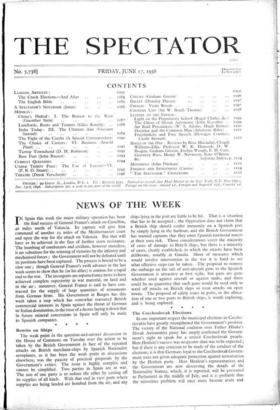Bombs on Ships The weak point in the question-and-answer discussion
in the House of Commons on Tuesday over the action to be taken by the British Government in face of the repeated attacks on British merchant-ships by Spanish Nationalist aeroplanes, as it has been the weak point in discussions elsewhere, was the paucity of practical proposals by the Government's critics. The issue is highly complex and cannot be simplified. Two parties in Spain are at war. The aim of one party is to reduce the other by cutting off its supplies of all kinds. With that end in view ports where supplies are being landed are bombed from the air, and any ships lying in the port are liable to be hit. That is a situation that has to be accepted ; the Opposition does not claim that a British ship should confer immunity on a Spanish port by simply lying in the harbour, and the British Government has warned captains that they enter Spanish territorial waters at their own risk. Those considerations cover the majority of cases of damage to British ships, but there is a minority of cases, clearly established, in which the attacks have been deliberate, notably at Gandia. Short of measures which would involve intervention in the war it is hard to see what effective steps can be taken. The proposal to remove the embargo on the sale .of anti-aircraft guns to the Spanish Government is attractive at first sight, but guns are guns whether used against aircraft or against tanks, and there could be no guarantee that such guns would be used only to ward off attacks on British ships or even attacks on open towns. The proposal of safety zones in ports, or the alloca- tion of one or two ports to British ships, is worth exploring, and is being explored.


















































